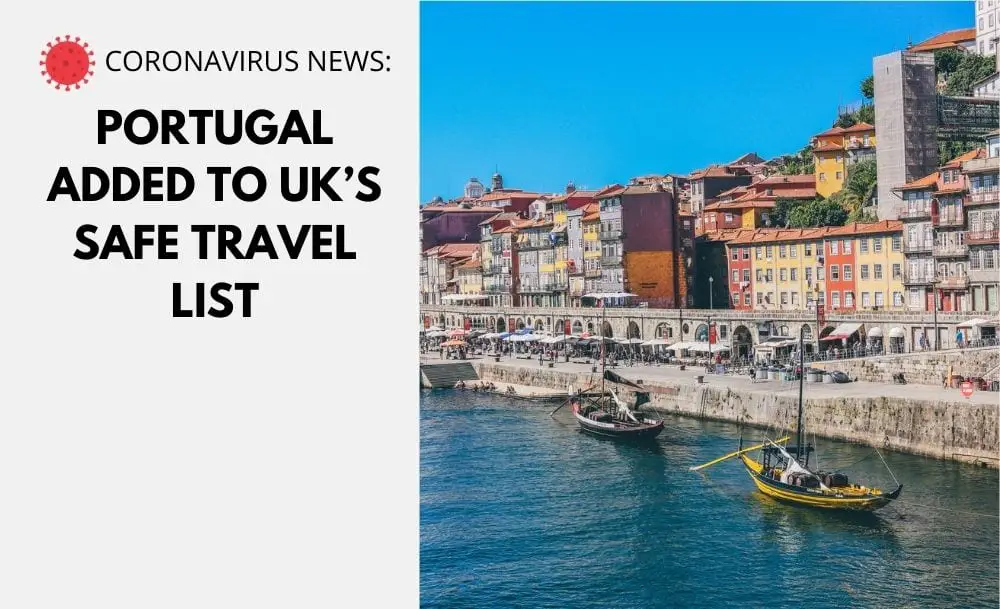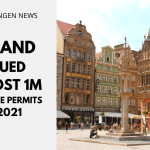Portugal added to UK’s safe travel list

Austria, Croatia and Trinidad and Tobago are removed
The UK has the highest number of travellers to Portugal, with more than 2.5 million tourists visiting every year and adding to the Portuguse tourism economy, last year according to the Office for National Statistics.
Portugal’s Algarve is the most popular destination which usually has more than 1.2 million tourists from the UK visiting yearly.
Since the UK and Portugal put in quarantine restrictions back in March and then started to ease European travel restrictions, Portugal has been one of the last countries that other European/Schengen countries have lifted travel restrictions for.
The UK introduced a compulsory 14-day quarantine for arrivals from overseas in early June.
By 7th July, the UK unveiled a list of “travel corridors” (the UK’s version of what other European countries are calling “green lists”), detailing countries that were exempt from quarantine.
Since then the UK has periodically updated that list, adding and removing countries based on each country’s coronavirus infection rates and how they compare with the UK's.
When the UK unveiled their travel corridors, the Portuguese government expressed “regret” at the UK's decision to continue to exclude it from the safe travel list.
Since then, travellers coming from Portugal have been faced with the need to quarantine for 14 days in the UK. Travellers that fail to self-isolate when required can be fined up to £1,000 in England, Wales, and Northern Ireland. In Scotland, the fine is £480, and up to £5,000 for persistent offenders.
From Saturday 22nd August at 04:00, travellers from the UK will also no longer need to quarantine after holidaying in Portugal. But travellers returning from Croatia, Austria (and Trinidad and Tobago) will have to self-isolate as those countries are being removed from the safe list.
The decision means that passengers from Portugal landing in the UK from 04:00 on Saturday 22nd, will be exempt from quarantine. But, funny enough, those already landed before that time, are supposed to complete the 14 days quarantine.
Meanwhile, the Scottish government has also added Switzerland to its list of countries requiring quarantine.
Scotland’s justice secretary, Humza Yousaf, tweeted: “If returning to Scotland from Austria, Croatia, Switzerland & Trinidad & Tobago you will have to self-isolate for 14 days. If returning from Portugal you will *no longer* need to self-isolate for 14 days. Above applies to Scotland, all changes come into effect 4am Sat 22nd August.”
If returning to Scotland from Austria, Croatia, Switzerland & Trinidad & Tobago you will have to self-isolate for 14days.
— Humza Yousaf (@HumzaYousaf) August 20, 2020
If returning from Portugal you will *no longer* need to self-isolate for 14days.
Above applies to Scotland, all changes come into effect 4am Sat 22nd August
The Welsh government said the Welsh chief medical officer, Dr Frank Atherton, did not agree with the Scottish government that there was sufficient grounds for including Switzerland on the Welsh quarantine list but indicated that was being kept under review.
“The chief medical officer for Wales does not support removing Switzerland from the list of exempt countries and territories at this time,” a spokeswoman said.
A Scottish government source said Switzerland’s Covid-19 statistics showed infections were “increasing and are at a level where it’s a judgment call. The Welsh, on balance, came down against. We came down in favour. The precautionary principle applies here for us.”

The Portuguese government welcomed the changes as “useful for all those who travel between Portugal and the United Kingdom”.
It said the move was “proof of the good outcome of intense bilateral work” and “allowed for an understanding that the situation in the country has always been under control”.
Luis Araujo, president of Turismo de Portugal, said: “We are now delighted to have arrived at a decision which we feel far better reflects the reality of the situation in Portugal.”
“Portugal has been welcoming guests from the United Kingdom since the beginning of July, therefore this is not the case of a country just opening its doors after battling the worst of the pandemic, but the case of a destination which has been operating with the capacity for international visitors for some time now following effective early action in the battle against the virus.”
“While this has been a period which nobody will ever forget, a period of time which has left behind a trail of destruction, sorrow, and pain – we are so thankful to be able to open our arms, even wider than before, to the people of the United Kingdom.”
It is, however, considered that the change in rules for Portugal was “likely to come too late to help many struggling holiday companies” and the consumer group, Which?, called for support for the travel industry.
The most recent update to the UK’s quarantine list comes after thousands of British travellers rushed for last-minute transport to get home from France, before the quarantine measures came into force.
It is thought that there are currently around 20,000 UK tourists in Croatia.
The UK government has shown that it is following a policy of making last-minute changes to travel and quarantine measures. It did so with France (and other countries) last week and Belgium the week before.
The policy made it “too risky” for tourists that are unable to quarantine to travel.
At the same time, holidaymakers wanting to follow government advice and avoid non-essential travel to specified countries are finding it difficult to claim a refund.
The change in quarantine rules is likely to produce a hit to Croatia’s tourism economy. According to the statistics of the European Union, Croatia is the eighth most popular European tourist destination, behind Spain, Italy, France, United Kingdom, Austria, Greece and Germany.
However, in Croatia, the share of tourism in GDP has reached as much as 18 percent in 2016 and has grown to 20%. This places Croatia in the group of countries together with Malta (14.5 percent) and Cyprus (13.2 percent). For example, in Spain, despite the economic crisis, tourism represents only 4.4 percent of GDP, and the share of tourism in GDP in other European tourist superpowers ranges from 2.1 percent in Italy and France to 1.1 percent in Germany.
The silver lining in the restrictions being added to Croatia at this time is that its tourism season generally ends at the end of August.
The World Health Organization (WHO) has also warned that the Balkans region, of which Croatia is part, was a “hotspot” for coronavirus. Dr Catherine Smallwood, Senior Emergency Officer, WHO Regional Office for Europe, told a WHO press conference: “The situation in the Balkans has been a concern of ours since early June when we started to see cases increase and it’s been very much a sub-regional hotspot over the summer period.”
According to the Department for Transport, weekly coronavirus cases are on the rise in Croatia, Austria, Trinidad and Tobago as follows:
Croatia – 164% increase: the weekly Covid cases per 100,000 people increased from 10.4 on 12 August to 27.4 on 19 August
Trinidad and Tobago – 232% increase over the past four weeks, in the number per 100,000 people between 12 and 19 August.
Austria – 93% increase: the weekly number of cases per 100,000 has risen from 10.5 on 13 August to 20.3 on 20 August
! TRAVEL UPDATE !
— UK Prime Minister (@10DowningStreet) August 20, 2020
From 04:00am on Saturday 22 August, if you are returning to England from the following countries you must now self-isolate for 14 days:
🇦🇹 Austria
🇭🇷 Croatia
🇹🇹 Trinidad and Tobago pic.twitter.com/2nPJ44yGsN
The UK Minister for Transport, Grant Shapps tweeted: “Data shows we need to remove Croatia, Austria and Trinidad & Tobago from our list of #coronavirus Travel Corridors to keep infection rates DOWN. If you arrive in the UK after 0400 Saturday from these destinations, you will need to self-isolate for 14 days.
Data shows we need to remove Croatia, Austria and Trinidad & Tobago from our list of #coronavirus Travel Corridors to keep infection rates DOWN. If you arrive in the UK after 0400 Saturday from these destinations, you will need to self-isolate for 14 days.
— Rt Hon Grant Shapps MP (@grantshapps) August 20, 2020
“Data also shows we can now add Portugal to those countries INCLUDED in Travel Corridors. As with all air bridge countries, please be aware that things can change quickly. Only travel if you are content to unexpectedly 14-day quarantine if required (I speak from experience!)”
Data also shows we can now add Portugal to those countries INCLUDED in Travel Corridors. As with all air bridge countries, please be aware that things can change quickly. Only travel if you are content to unexpectedly 14-day quarantine if required (I speak from experience!)
— Rt Hon Grant Shapps MP (@grantshapps) August 20, 2020
The Minister for Transport himself spent two weeks in quarantine Spain was suddenly put on the quarantine list, on 26 July, whilst he was in Spain.
Austria has been taken off the travel corridor due to concern over its coronavirus infections. In a sign of diverging approaches between the devolved nations, Scotland is also moving separately to remove Switzerland from its own travel corridor list.
Croatia, along with Austria, and Trinidad and Tobago are being removed and the UK’s Foreign Office has updated its travel advice to advise against all but essential travel to all three countries. It has added Portugal to its list of countries exempt from its global advisory against non-essential travel.
The decision has been based on a “significant change in both the level and pace of confirmed cases”
Additionally, it is understood that Greece is now also being kept under close as concerns over rising COVID-19 infections.
How to Avoid the UK Quarantine
The guidance from the UK government is that “You will need to self-isolate if you visited or made a transit stop in a country or territory that is not on the list in the 14 days before you arrive in England.”
Therefore, you will need to quarantine if you travel from any country not on the UK Safe countries list. But what if you can’t or don’t want to quarantine, what are your options?
Like most other travellers faced with quarantine, your first option is to get yourself back into the UK before the cut-off dates. This may be easier said than done, but not impossible and may come at a cost.
Worst case scenario, you could get a private jet at a cost of £3500 for two people. So why not travel back in style?
Not wanting to do that? Instead of returning to the UK to quarantine, you could consider to travel to a safe country instead, like Portugal or Italy and stay there for 14 days.
If you choose this route, you won’t need to quarantine and you could spend almost the same money or less than if you are in the UK.
If you are employed, you may be able to work remotely. If self-employed, what’s the problem, unless you need to be present at work?
What about driving non-stop?
Germany also adds areas of Croatia to quarantine list after recording a spike in new cases
Germany has also added Croatia's coastal regions of Sibenik-Knin and Split-Dalmatia to the list of “high-risk” areas. This was done 1 day before the UK.
It means that all travellers returning to Germany from these areas have to be tested and go through a 14-day quarantine once you arrive in Germany.

Germany saw an additional 2034 new COVID-19 cases in a 24 hour period. This is the highest number since April.
Germany, along with Iceland, is widely seen as a model for containing the virus in Europe. This is because of an early, aggressive, test and trace policy. But, like in most countries across the European Union, it too has seen an increase in infections.
The Robert Koch Institute (RKI), the German public health agency which monitors the COVID-19 numbers in Germany. It confirmed that the rates of infection are increasing.
“This development is very concerning and increasing in dynamic. A further worsening of the situation must be avoided,” RKI wrote in its daily report.
But more importantly, the institute noted the average age of people being infected has been decreasing and that the younger people being infected has been increasing and is now “much higher” than in older age groups.
“On the one hand, the increase in younger age groups needs to be stopped, on the other hand, transmission into older and vulnerable groups needs to be prevented. As soon as the number of infections rises among elderly people, hospitalisations and the number of deaths will likely rise as well,” it warned.
The increase in coronavirus cases has led the German government to put all of Spain, except the Canary Islands, and many parts of the Balkans on its list of high-risk areas.
Chancellor Angela Merkel said earlier this week that “more mobility and contacts are leading to increased case numbers” and stressed that the federal government priorities are “maintaining economic life and enabling schools and daycare”.
What are your thoughts on the UK’s lifting of quarantine measures for Portugal? Comment below!
IaM can help with your visa application to the UK, Austria, Croatia & other countries
If you need help with a UK Visa, or visa to Europe, including help with appointment booking obligations, IaM can help.For more information and advice on Schengen visas, UK immigration law and UK visa applications Or If you need any help or assistance please, reach out to your Visa Coordinator at IaM.











